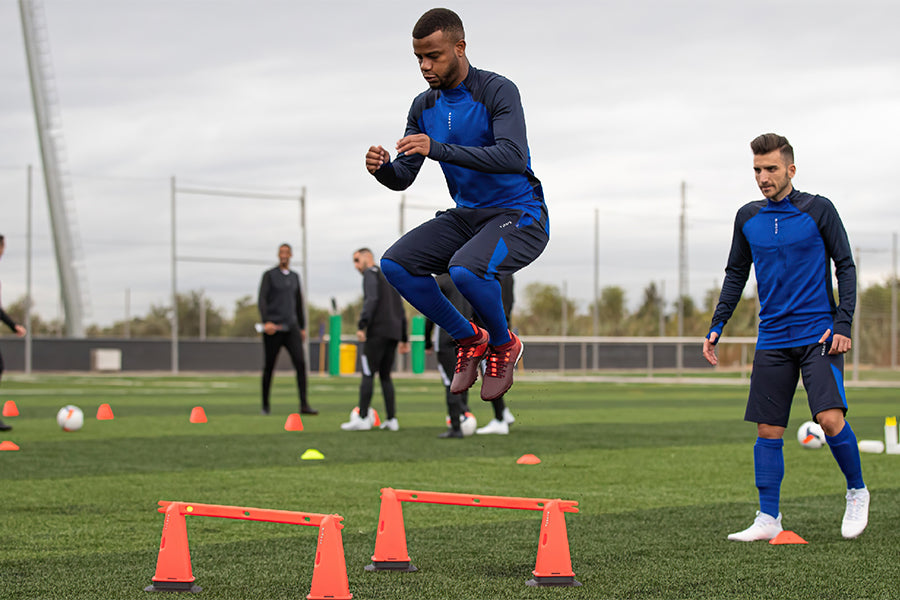Listen up, football fanatics! We all know that getting bigger, faster, and stronger is essential for dominating the field. But let's face it, not all of us know how to train like a pro. Some players skip it entirely, while others focus on the wrong things.
If you're serious about crushing your opponents, you must follow a specially designed full-body workout program for football players. Say "goodbye" to generic weightlifting routines and "hello" to exercises that target all major muscle groups used in football.
Lucky for you, we've got a sample 3-day intermediate level workout routine that will have you feeling like a beast on the field. So, get ready to pump some iron and earn those touchdowns!
Why Is Strength Training Important for Football Players?
Football is a high-energy game that demands fast, agile, and explosive players while maintaining balance. The game moves at breakneck speed, putting your body under immense pressure. To keep up, you'll need a combination of strength and stamina to tackle everything the game throws at you.
But it's not just about physical prowess. Mental toughness and the ability to thrive under pressure are just as essential to succeed on the field.
Strength Training Improves Your Strength

Strength training increases muscle mass, making you strong and giving you more endurance and power to prove yourself in the game. Lifting weights and engaging muscles also improve your overall fitness level, reduce stress, uplift your mood, and help you be at your best.
These things, when combined, help you be mentally strong and resilient, giving you a unique edge on the ground.
Benefits of Strength Training for Football Players
Football is a physically demanding sport that requires players to be intense, quick, and explosive while maintaining stability. Your body will be under immense pressure because the sport is fast and furious, and you should have the right combination of forces to handle the pressure and speed of the game.
You do not just need physical strength, but mental strength and the ability to bear pressure are also necessary to be a successful player in the sport.
Strength Training Enhances Confidence
Strength training enhances your physical abilities and overall fitness and boosts your confidence, leading to improved performance on the field. By incorporating strength training into your routine, you'll feel more confident in your abilities, allowing you to bring your best to every game.
Increased Agility and Quickness
Strength training can improve agility and quickness by increasing a player's ability to change direction quickly and easily move in all directions. These abilities are essential for footballers, who must change direction rapidly and dodge opponents while maintaining possession of the ball.
Better Overall Health
Strength training has numerous health benefits, including improved cardiovascular health, reduced risk of chronic diseases, and better mental health. Footballers can improve their health and well-being by incorporating strength training into their routines.
Want a fit body like a football player?
— CNBC-TV18 (@CNBCTV18News) December 18, 2017
Legendary footballers Sami Hyypia & @LuchoGarcia14 get you some workout tips on the 27th edition of #StayFitWithCNBCTV18 pic.twitter.com/lZEYJdr3BQ
Related Article: Tips for Stronger & Defined Legs
Workout Summary
|
Main Goal |
Increase Strength |
|
Workout Type |
Full Body |
|
Training Level |
Intermediate |
|
Program Duration |
12 weeks |
|
Days Per Week |
3 |
|
Time Per Workout |
60-75 minutes |
|
Equipment Required |
Barbell, Bodyweight, Cables, Dumbbells, EZ Bar, Machines |
|
Target Gender |
Male & Female |
|
Suggested Supplements |
Workout Description
Are you ready to become an unbeatable football player? It takes more than just speed and strength. You need a rock-solid core and whole-body stability to avoid injuries and beat the competition.
Our unique workout plan covers it all! You'll build muscle and strength from head to toe, not just in your arms and legs. Your entire body will be a formidable block of strength.
We'll challenge every muscle in your body, toning your legs for speed and building a solid core for maximum stability. You'll train with serious weightlifting and agility-boosting exercises until you reach muscle failure.
That's right - training for failure is the secret to massive strength gains and endurance, essential for high-intensity sports like football. So are you ready to become a solid, unstoppable force on the field? Let's get started!
Warm-Up

Before jumping into this workout routine, prioritize a strict 5-minute warm-up. It's crucial to prepare your body for the upcoming exercises. It's easy to underestimate the importance of a good warm-up, but let's break that habit and do it right.
Remember to follow up with 10 minutes of stretching after the warm-up. Your body will thank you!
Related Article: How to Warm Up for a HIIT?
Workout Frequency
Get fit in 12 weeks with only 3 workout days per week! You'll hit the gym for 3 days and let your body rest and heal for the other 4. Our balanced workout plan targets your whole body for an effective fitness experience.
Daily Workout Schedule
Monday: Strength and Power
Tuesday: Rest
Wednesday: Speed and Agility
Thursday: Rest
Friday: Endurance and Core
MONDAY: Strength and Power
|
Exercises |
Sets x Reps |
|
Warm-up |
5-10 minutes of light jogging and dynamic stretching |
|
Squats |
3 sets of 8-12 reps |
|
Deadlifts |
3 sets of 8-12 reps |
|
Bench Press |
3 sets of 8-12 reps |
|
Pull Ups |
3 sets of 8-12 reps |
|
Single-leg Romanian Deadlifts |
3 sets of 8-12 reps per leg |
|
Plyometric Box Jumps |
3 sets of 8-12 reps |
|
Medicine Ball Slams |
3 sets of 8-12 reps |
|
Cool-down |
5-10 minutes of light jogging and static stretching |
WEDNESDAY: Speed and Agility
|
Warm-up |
5-10 minutes of light jogging and dynamic stretching |
|
Ladder Drills |
3-4 different exercises, 3 sets each |
|
Cone Drills |
Zig-zag sprints and cutting drills, 3 sets of each |
|
Shuttle Runs |
3 sets of 5 reps (back and forth) |
|
Single-leg Hops |
3 sets of 8-12 reps per leg |
|
Skater Jumps |
3 sets of 8-12 reps per side |
|
Sprint Intervals |
8-10 sets of 20-30 seconds, with 1-minute rest between sprints |
|
Cool-down |
5-10 minutes of light jogging and static stretching |
FRIDAY: Endurance and Core
|
Warm-up |
5-10 minutes of light jogging and dynamic stretching |
|
Long-distance Run |
20-40 minutes at a steady pace |
|
Planks |
3 sets of 30-60 seconds |
|
Side Planks |
3 sets of 30-60 seconds per side |
|
Russian Twists |
3 sets of 12-15 reps per side |
|
Bicycle Crunches |
3 sets of 12-15 reps per side |
|
Leg Raises |
3 sets of 12-15 reps |
|
Mountain Climbers |
3 sets of 30-45 seconds |
|
Cool-down |
5-10 minutes of light jogging and static stretching |
How Do Footballers Recover After Training?
Proper recovery is a crucial aspect of training for footballers. While players may have less recovery time during pre-season as they work on improving their cardiovascular fitness, they prioritize recovery once the season ends. Planning for recovery in advance is essential for optimal performance.
Let's see how to recover quickly!
Replenish with Water and Electrolytes

Footballers lose a lot of fluids and electrolytes during training, so it's crucial to replenish them after the workout. Drinking water is essential for rehydration, but an electrolyte supplement or sports drink can help replace the minerals and nutrients lost during exercise.
Include Protein and Carbohydrates in Your Post-Workout Meal
Protein is vital for muscle repair and growth, while carbohydrates help replenish glycogen stores. A post-workout meal should ideally include a mix of both.
Pre-workout powder and EAAs can also help boost protein intake and support muscle recovery.
Take a Rest Day
Rest is just as crucial as training when it comes to recovery. Footballers should take at least one rest day per week to allow their bodies to recover fully.
During this time, they can incorporate light activities such as stretching or yoga to help ease muscle soreness and promote blood flow.
Utilize Recovery Tools

Footballers can also use recovery tools such as foam rollers and stretching bands to aid muscle recovery. These tools help relieve muscle tension, promote blood flow, and reduce soreness.
Quality Sleep
Sleep is essential for muscle repair and growth. Footballers should aim to get at least 7-8 hours of sleep per night to allow their bodies to recover fully.
What Do Footballers Eat?

When we think of footballers, we imagine ripped abs and biceps that could lift a small car. But what do they eat to maintain those muscles? Well, for starters, forget about your average trips to McDonald's.
Footballers pay strict attention to their diets, ensuring they consume enough protein to rebuild and strengthen their muscles. Grilled chicken with some veggies is a standard meal for footballers.
And remember the carbs! They need them to fuel their intense training sessions and long games. So, while we might be lining up for a cheeseburger, these athletes are chowing down on nutritious meals that would put our diets to shame.
FAQs
1. How can footballers increase their stamina?
Footballers can increase their stamina by incorporating cardiovascular training, interval training, plyometric training, high-intensity training, and maintaining a healthy diet and hydration level.
2. How many days a week should a football player work out?
The number of days a week a football player should work out can depend on several factors, including their position, level of play, and training goals. Generally, most football players should work out at least 3-4 days a week.
These workouts should include a combination of strength training, cardiovascular exercise, and agility drills to improve their overall fitness and performance on the field. Incorporating rest days into your workout routine is also essential.
3. Do footballers need a gym?
While footballers can improve their fitness and performance with various exercises and drills, incorporating gym workouts can be beneficial. Gym workouts can help footballers build strength, improve endurance, and reduce the risk of injury.
However, the type and frequency of gym workouts can vary depending on the player's position, training goals, and overall fitness level.
4. What should footballers avoid eating before a match?
Footballers should avoid eating foods high in fat, fiber, and sugar before a match. These foods take longer to digest, leading to stomach discomfort and sluggishness on the field.
Instead, they should opt for easily digestible foods such as lean proteins, complex carbohydrates, and plenty of fluids to fuel their performance.
The Bottom Line
Football players have unique physical demands compared to many other athletes. The three-day workout plan outlined here is explicitly designed to help football players reach peak athletic performance.
Strength training can contribute in a big way to optimizing physical skills and agility on the field, as well as reducing the risk of serious injury.
Incorporating the specific exercises described here into your existing program can provide incredible benefits that will give you an edge during competition.
No matter your level of play, you can maximize your potential and become an all-star footballer in no time with the proper training regime. So get out there, lace up your boots, and build soccer strength!











